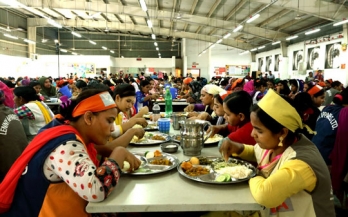As part of the Workforce Nutrition Alliance, urges Colombian regulators and policymakers to support employers by further developing and implementing public policies for improved workforce nutrition.
As elaborated in a GAIN evidence brief, poor-quality diets and insufficient food quantity are linked to reduced work capacity. This suggests that the malnutrition burden can be partly addressed through a win-win-win approach which improves individual lives, business outcomes, and national economies.
GAIN’s Workforce Nutrition program conceived and implemented a market-based supply chain solution to enhance the food environment around tea estates by leveraging the existing neighbourhood line shops to improve access to healthy foods.
GAIN, Unilever, and the Sustainable Trade Initiative (IDH) saw an opportunity to improve the nutrition and health of farmers, workers, and their families in supply chains, whilst working to increase supplier and worker satisfaction, productivity and brand loyalty.
GAIN, together with implementing partners along with responsible Brands and Buyers worked collectively with the Government of Bangladesh (GOB)1 to incorporate workforce nutrition programs as a priority.
Over half the global population spends one third of their adult life at work, and a third of the global population also suffers from some form of malnutrition. This paper reviews prior research on gender issues in the workplace, with the objective of clarifying the implications of these norms for workplace nutrition programming in low- and middle-income countries.
This study aimed to do something that had not been done before: apply business case thinking to worker nutrition programmes in supply chains, using a structured and systematic approach. The study extended the definition of "business case" beyond financial returns on investment to cover a broad range of possible motivations for companies and sectors to invest in nutrition in their supply chains.
There are many complex and political challenges faced by companies working with large and diverse supply chains. For the cocoa sector, child labour, attaining a living income and deforestation are often seen as the most urgent. However, one area that affects productivity, profitability and reputation but is relatively easy to solve is workers’ nutrition.
This slide deck offers recommendations on the provisions of nutritious foods during the global COVID-19 pandemic and is part of a broader effort to develop an implementation support programme, supporting employers to implement Workforce Nutrition programmes.
One in three people globally suffers from at least one type of malnutrition. Malnutrition brings significant losses in productivity and potential, and poses challenges to employers in all settings. 58% of the world’s population will spend one third of their time at work during their adult life, so employers have an opportunity to help tackle malnutrition.










